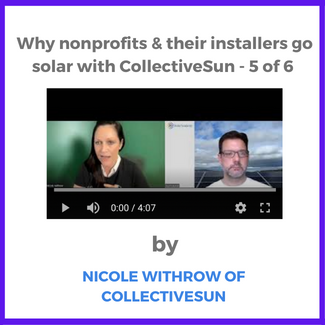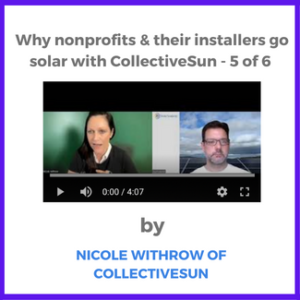In this fifth video in the 6-part series on why nonprofits and their installers go solar with CollectiveSun, Nicole Withrow of CollectiveSun and Kerim Baran of SolarAcademy dig into the details of how the ownership transfer of a solar system occurs after 6 years (from CollectiveSun to the nonprofit). The video is below.
Below is the video transcription:
Nicole Withrow of CollectiveSun: It’s a $0 net purchase. So they’re able to take ownership for the price they’ve already paid. They already prepaid the 88%. So at the end of the fifth year, we’ll start bringing them up to speed. If there are new staff members, make sure they understand what the termination right. looks like, the early termination right. And we will make sure all their questions get answered, hare the template that they will use to exercise the termination right, and then when that timeframe hits they can exercise the termination right, take ownership of the solar system. At that point, we transfer the asset to them.
They’re now the owner of the solar system and we pass through all of the remaining useful life that still exists on the workmanship warranty from the installer, on the robust warranties, on the equipment for the panels and the inverters. That gets passed through to them. There’s still a lot of useful life there, but that terminates a Solar Power Agreement and CollectiveSun’s relationship with the nonprofit. They’re now the owner of the solar system. So that dissolves the SPA.
Kerim Baran of SolarAcademy: When you design this 12% discount, there’s a 26% federal tax credit that is generally available to for-profit entities. And I understand you bring in a tax equity investor to basically capture that benefit by owning the system for the first six years. And then what happens? So being at the beginning, year zero to year six, and then what happens after year six?
Nicole: So the contract is between CollectiveSun and the nonprofit, the Solar Power Agreement. Once the system is built, we will assign that to the tax investor. So you’ll see that SPA get assigned to your particular tax investor, but CollectiveSun will remain the party that still carries out all of these obligations in the Solar Power Agreement between the nonprofit and CollectiveSun.
So we’ll still be that third party that reaches out to coordinate a time for the installer to come do an inspection or make a repair or investigate if there’s a scenario where something’s not looking right on the monitoring of the system. But assuming everything is going smoothly and there aren’t any issues. Solar systems are usually low maintenance. But if something comes up, we’ll take care of it promptly. You know, there’s not a lot of maintenance to worry about with solar systems, but at the end of the sixth year the early termination right becomes available in the SPA. The benefits are fully consumed for the nonprofit, and at that point, the nonprofit can take ownership of the solar system.
If they would like to remain IRS compliant, we have to give them an option to stay in the Solar Power Agreement for the length of the SPA, which is 20 years. Or they can elect this early termination right which allows them to take ownership of a solar system for that amount they already prepaid. So it’s a $0 net purchase. No additional cost to take ownership.
We’ll reach out and explain the early termination right to any new staff members that may be employed at the nonprofit filling roles that they maybe weren’t in at the time this agreement was executed. We make sure they’re up to speed. But essentially once they execute that early termination right, we just transfer the solar system to the nonprofit and pass through all of the wonderful warranties that exist from the installers. The 10-year workmanship warranty is still has got a lot of useful life on it. And those robust warranties on the panels and inverters, they’ve got a 25 year warranty on the panels and 20 on the inverters. So we’re going to pass that through so they can benefit from that. But that terminates the relationship between CollectiveSun in the nonprofit.
Kerim: They become the owner of the system at that point.


